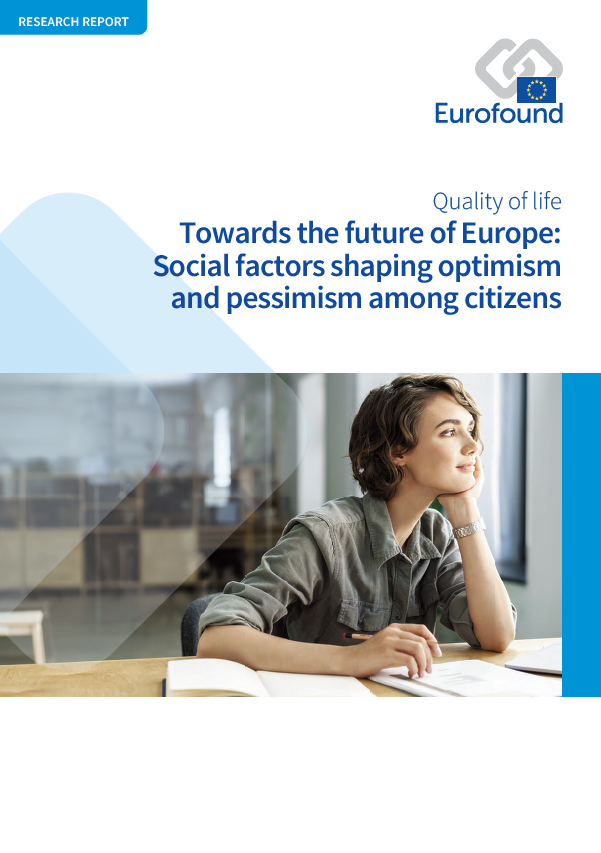
În majoritatea regiunilor UE, nesiguranța cu privire la viitor este în creștere de peste un deceniu. Mulți oameni cred că societatea este în declin, iar acest lucru a dat naștere unui climat general de pesimism. Există oare o legătură între popularitatea crescândă a partidelor antisistem și adâncirea pesimismului? Aceste sentimente negative ar putea să afecteze climatul politic în unele state membre și, de asemenea, să submineze legitimitatea proiectului european. Raportul de față identifică principalii factori determinanți ai modului în care oamenii percep viitorul și analizează ipoteza că optimiștii și pesimiștii diferă din punctul de vedere al caracteristicilor politice, culturale și socioeconomice. Pentru a afla în ce măsură optimiștii și pesimiștii se comportă și se simt diferit, raportul analizează profilurile lor socioeconomice și sociopolitice. În sfârșit, raportul cercetează modul în care nivelul de optimism în statele membre diferă în funcție de contextul național. Analizele folosesc date din perioada anterioară pandemiei de COVID-19, iar rezultatele demonstrează că va fi important să se monitorizeze evoluția sentimentelor oamenilor cu privire la viitor pe perioada de redresare după criză.
Key findings
As Europe emerges from the pandemic, it will be crucial for policymakers to understand the drivers of optimism and pessimism in order to address the challenges arising from potentially growing disillusionment. Evidence shows that high levels of pessimism can undermine social cohesion and the legitimacy of the established political system.
Age appears to have the greatest net effect on social optimism: young people were found to have the happiest outlook, in middle age there was a dip in positivity, then optimism increased again among older people.
Trust in institutions and GDP growth rates were found to be key country-level drivers of optimism. Evidence highlights that facilitating access to high-quality public services can help to (re)build trust in institutions.
Citizens who feel their voice counts are not only more optimistic about their own future but also about the society in which they live. Initiatives that involve citizens in the debate about the recovery process, such as the Conference on the Future of Europe, will be critical going forward.
Findings point to the important role a person’s place in the labour market and their financial situation plays in their perception about the future. As emphasised by EU leaders in the 2021 Porto Declaration, a shift in policy focus from protecting jobs to creating new opportunities will be required to improve the EU’s employment situation.
The report contains the following lists of tables and figures.
List of tables
- Table 1: Social Optimism Index – Six questions
- Table 2: Assessment of the impact of the economic crisis on the job market by social optimism level, EU27, 2019 (%)
- Table 3: Key drivers of social optimism and pessimism
- Table 4: Perceptions relating to the economic crisis by level of social optimism, EU27 (%)
- Table 5: Views on the future living conditions of children and young people by level of social optimism, EU27 (%)
- Table 6: Political efficacy by level of social optimism, EU27 (%)
- Table 7: Voting behaviour by level of social optimism, EU27 (%)
- Table 8: Assessment of the political system by level of social optimism, EU27 (%)
- Table 9: Perceptions of the EU by level of social optimism, EU27 (%)
- Table 10: Prospects for future generations in the EU by self-reported social class, EU27 (%)
- Table 11: Subjective social mobility and optimism, EU27 (%)
- Table 12: Perceptions of social inequality by level of social optimism, EU27 (%)
- Table 13: Views on potential political actions to tackle inequality by level of social optimism, EU27 (%)
- Table 14: Personal and societal sense of fairness, EU27 (%)
- Table 15: Personal and societal sense of fairness by level of social optimism, EU27 (%)
- Table 16: Social optimism: country-level domains and factors
- Table 17: Personal and societal expectations: level of optimism in the EU27 (%)
List of figures
- Figure 1: Social optimism: emotional dimension, EU27, 2019 (%)
- Figure 2: Social optimism: evaluative dimension, EU27, 2019 (%)
- Figure 3: Social optimism: cognitive dimension, EU27, 2019 (%)
- Figure 4: Social Optimism Index scores by response category
- Figure 5: Expectations about a return to growth following the economic crisis by level of social optimism, EU27, 2017 (%)
- Figure 6: Perceptions about change in quality of life by level of social optimism, EU27 (%)
- Figure 7: Opinion about prospects for future generations by EU Member State (%)
- Figure 8: Likelihood of voting in the next European Parliament election by level of social optimism, EU27 (%)
- Figure 9: Image of the EU by level of social optimism, EU27 (%)
- Figure 10: European identity by level of social optimism, EU27 (%)
- Figure 11: Social optimism by self-reported social status, EU27 (%)
- Figure 12: Views about state intervention by level of social optimism, EU27 (%)
- Figure 13: Belief in functioning meritocracy by level of social optimism, EU27 (%)
- Figure 14: Social Optimism Index scores (mean) by EU Member State
- Figure 15: Proportion of optimists and pessimists by EU Member State (%)
- Figure 16: Pessimism gap: personal and societal pessimism by EU Member State (%)
- Number of pages
-
70
- Reference nº
-
EF21004
- ISBN
-
978-92-897-2203-2
- Catalogue nº
-
TJ-03-21-369-EN-N
- DOI
-
10.2806/458259
- Permalink
Cite this publication
Eurofound (2021), Towards the future of Europe: Social factors shaping optimism and pessimism among citizens, Publications Office of the European Union, Luxembourg.